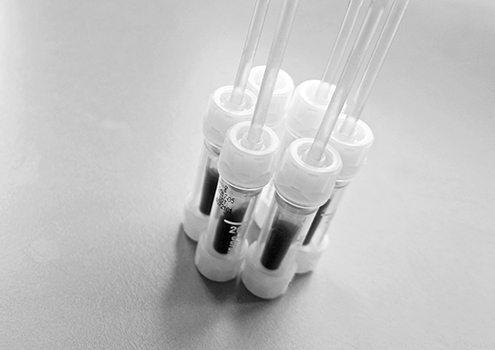A pilot study launched at the BC Cancer Agency aims to use UBC-developed screening technology to determine whether it is possible to detect early signs of cancer in healthy volunteers with a simple blood test.
By using a new method to detect DNA from cancer cells in the blood of volunteers with no known disease, the Cancer DNA Screening Pilot Study (CANDACE) will attempt to validate a simple and inexpensive screening blood test that could alert individuals to the presence of early cancers that might otherwise go undetected until symptoms develop.
For many types of cancer, early detection means more treatment options and better outcomes. Most population-based cancer screening methods such as mammography and colonoscopy are used to search for a single type of cancer. For other cancers, such as pancreatic or ovarian cancer, routine screening methods do not yet exist or are not clinically practical.
The technology, developed by UBC spin-off company Boreal Genomics, can detect 96 common mutations seen in at least eight cancer types including lung, breast, colorectal, ovarian, pancreatic, skin, bladder and endometrial cancers, and may detect other cancers as well.
“This new technology for detecting cancer DNA in the blood has the ability to screen for many cancers at once,” says principal investigator Alan Nichol, Radiation Oncologist at the BC Cancer Agency and a Clinical Associate Professor in the Department of Surgery. “We hope the CANDACE study will demonstrate that this blood test can detect a broad range of cancers while they are curable.”
The CANDACE study will recruit 1,000 volunteers from the BC Generations Project between the ages of 55 and 75 who have not been diagnosed with cancer in the past. Participants who have a positive test result will be examined further using standard-of-care diagnostic methods, including medical imaging, to confirm whether the blood test has correctly indicated the presence of a cancer. The study is expected to be completed and results gathered by September 2017.
CANDACE will assess the clinical utility of a test based on technology developed by UBC and Boreal Genomics that has been previously shown to detect cancer DNA present in very low levels in the blood.
“We have invented a very powerful technology for extracting a small number of cancer DNA molecules from the large amounts of normal DNA present in everyone’s blood,” says Andre Marziali, a Professor and Director of Engineering Physics at UBC and Chief Science Officer of Boreal Genomics. “This enrichment for tumor DNA has enabled us to develop a highly sensitive test for tumor DNA in blood that promises to be a revolutionary cancer screening tool.”
The CANDACE study is led by the BC Cancer Agency in collaboration with the University of British Columbia, Boreal Genomics, the BC Generations Project and Pathway Genomics.
